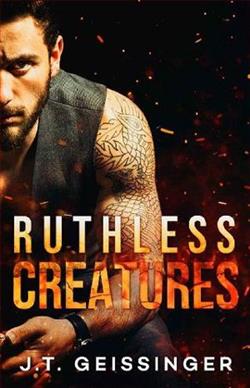Page 97 of Wicked Intentions (Wicked Games 3)
“Tell me a story, Mariana,” he whispers, lips moving against my forehead.
“A story? What kind of story?”
“A story about a little girl who lived in the hills and ate dirt to survive,” he says with infinite gentleness. “The story of you.”
I turn my face to his neck. He squeezes me tighter when he feels the tremor run through me. Then, when I’ve gathered the courage and decided where to start, I take a deep breath and begin.
Twenty-Five
Mariana
“Once upon a time, there was a shy little girl named Mariana. She was born in Colombia, in a small village called Chengue, in the Sucre province, a northern coastal mountain range near the Caribbean Sea. Most people there were cattle farmers, but Mariana’s parents farmed avocadoes. No matter what they farmed, however, the people of that region were poor. Peasants. The little girl didn’t understand that until many years later. She thought the wild hills she roamed with her scruffy yellow dog were paradise.”
I pause to draw a breath, wondering if Ryan knew it would be easier to tell this as if it happened to someone else—just a girl in a story, not me.
I decide he probably did.
“Colombia was—and is—a country of great beauty, but also great violence. It’s been embroiled in civil war for more than fifty years. People think coffee and drugs are the main fuel of its economy, and they are, but there are also kidnappings for profit, assassins for hire, and death squads that roam the countryside, paid by the government to quell any rebellion.
“Misery is big business there. Death is an accepted part of life. But all was well in tiny Chengue. Mariana and her older sister, Nina, helped her parents on the farm, and they went to school in the village and led a normal, happy life.”
Beneath my cheek, Ryan’s heart beats faster. He instinctively knows what’s coming before it even leaves my lips.
“Until one night, the paramilitary came before dawn and started pulling people from their homes.”
I close my eyes and listen to the beat of Ryan’s heart, the ache of devastation burning through me even after all these years.
“The soldiers took everyone to the center of the village. There was so much screaming, so much confusion, so many shiny black pools of blood. A few, including Mariana and her sister, escaped to the hills. They couldn’t escape the screams, though. They lasted all through the night, horrible screams and gunfire and shouting that echoed up into the hills like the voices of angry ghosts.
“When it was over, the paramilitary set fire to everything. Mariana and her sister huddled together high up in the branches of a tree they’d climbed, and watched the only home they’d ever known burn to the ground.”
“I know this story,” Ryan says in a low, raw voice. “I’ve heard of Chengue. It was alleged that the Colombian government assisted the FARC guerillas with the killings.”
“Alleged, but never proven. Not that it matters either way. When dawn rose over the village, both Mariana’s parents and nearly everyone else she’d ever known were dead. The avocado fields were smoking and black. The cattle had been slaughtered. Her beloved yellow dog lay still in the dirt, missing half his head.
“Mariana was six at this time. Her sister, Nina, was ten. For the next four years, they hid in the hills with a few other children, living like scavengers, little nocturnal animals stealing what they could from nearby villages to survive. They hid from the guerillas who swept through every so often, starving and filthy and forgotten by the rest of the world.”
“Jesus,” Ryan says, his voice choked.
I smile sadly. “No. He never showed his face in Chengue. He forgot about them, too.”
Ryan rolls us to our sides, pulls me up against him so my back is nestled against his chest, and draws his knees up behind mine. He pulls me tight to his body, his arm an iron band around my waist, and buries his face in my hair.
“One day,” I continue, my voice sounding very faraway to my own ears, “the guerillas finally caught the children. They were so weak by then. Just skin and bones, their eyes huge and sunken in their lice-ridden heads. The few boys in the group were quickly killed. Their necks were so brittle, so easily snapped. But the girls…well. Unfortunately, the girls were pretty. That’s what they said, anyway, the men who dragged them kicking and screaming from their hiding places. They said words like pretty and money and pure, and although the girls didn’t know what they meant, they knew enough to be terrified.
“And so they were sold to a trafficker named Beatriz, a woman with gold teeth and no soul, who took off their clothes and inspected them to see if they’d ever been had by a man.”
Behind me, Ryan’s breathing is uneven. His body is shaking in reaction to my words, when strangely I feel more and more calm as I continue to
speak, as if I’m releasing poison from my veins.
“The girls were taken to the port. They were loaded with other girls from other villages into a shipping container. There were no lights. There was no food. Each girl was chained to the wall, a collar around her throat, steel cuffs around her ankles and wrists, one gallon of drinking water in a plastic bottle by her side. They sat in the darkness for days that were like decades, listening to each other’s pitiful cries and retching from seasickness, until one by one they fell silent and there were only a few more whimpering voices left.
“By the time the rocking stopped and the doors creaked open, none of them were making any sounds at all. Mute and wretched, they lifted their eyes to the light.”
I have to stop. My throat has closed in on itself as it did when that container door creaked open and I caught my first glimpse of Reynard’s horrified face.
I was nothing by then. I wasn’t even human. I was an animal. The only instinct I had left was primal rage.















